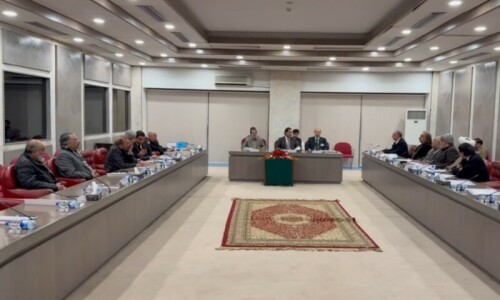ISLAMABAD: The tobacco industry is actively trying to get reversed the Ministry of National Health Services’ (NHS) decision to have pictorial warnings cover 85 percent of cigarette packets from May 31.
Tobacco growers and sellers have been sending delegations and writing letters to the ministry.
In their letters, they claim that the move to introduce new pictorial warnings would destroy their business and negatively impact the country’s economy.
The NHS Minister said the decision has been made after consultations with the ministry of law and permission from provincial governments, so it will be implemented.
On February 11, the NHS Ministry announced its decision to increase the size of pictorial warnings on cigarette packets from covering 40 percent of a packet to 85 percent from May 31, 2015. It was announced that the decision would apply to imported cigarettes as well.
Industry reacting to NHS ministry’s decision to increase size of pictorial warning
Nongovernmental organisations welcomed the decision but doubted the government’s ability to implement it in the face of pressure from the influential tobacco industry.
They quoted instances of governmental failure to implement similar decisions in the past. In December 2013, in a meeting of the Committee on Tobacco Advertisement Guidelines (CTAG), a decision was made to ban tobacco advertisement, banners, hoardings and names of cigarette brands from store displays.
However, one week before the decision was to be implemented on 31st May 2014, the tobacco industry managed to obtain a stay order from the Sindh High Court.
An NHS ministry official, requesting anonymity, said as soon as the February 12 decision was announced, the tobacco industry began raising objections.
“The first objection, the industry raised, was that the ministry should have advertised the decision 15 days before announcement which came as a surprise. The industry claimed that the decision would not affect tobacco sales and would instead encourage smuggling of cigarettes. This would reduce the revenue earned by the country and loss of sales tax collected on cigarette packs,” the official said.
“The tobacco industry also wrote letters to the Federal Board of Revenue (FBR) chairman to convince him to help withdraw the decision,” he said.
He rejected the tobacco industry’s claim that pictorial health warnings would encourage smuggling of cigarettes.
Moreover, the tobacco industry stated in the letter that the pictorial warnings will affect its freedom of trade, while in the same letter it claimed that pictorial warnings would not affect sales, the official said.
He said that the World Health Organisation (WHO) has scientifically established that warnings on cigarette packs discourage young people from picking up smoking and encourage smokers to quit.
“In a letter sent to the FBR chairman, the tobacco industry also posited that since health is now a subject devolved to provinces, the federal minister’s decision should not be implemented,” he said.
In response to the industry’s letters, rights group TheNetwork for Consumer Protection also sent a letter to the FBR Chairman.
TheNetwork contended that as Pakistan is a signatory to the WHO treaty-Frame Convention on Tobacco Control 2004, the federal government is under obligation to regulate the tobacco industry.
It noted in the letter, pictorial health warnings were to be changed yearly but this has not been done since 2010.
NHS Minister Saira Afzal Tarar told Dawn that not only representatives of the tobacco industry but also tobacco growers and shop keepers have been sending letters and visiting the ministry.
“It is unfair of them to say the decision should have been advertised 15 days earlier. If we had advertised the decision, surely, the tobacco industry would have gone to court and obtained a stay order,” she said.
In response to a question, Ms Tarrar said going to court is the industry’s right but the ministry would also defend its case.
“The tobacco industry is not ready to accept that such a step could be taken in Pakistan,” she added.
“We contacted the law ministry for legal advice. As per the ministry’s advice, we sought written permission from all four provinces before implementation of the decision. The ministry will not reverse its decision,” she said.
Published in Dawn, February 27th, 2015
On a mobile phone? Get the Dawn Mobile App: Apple Store | Google Play












































